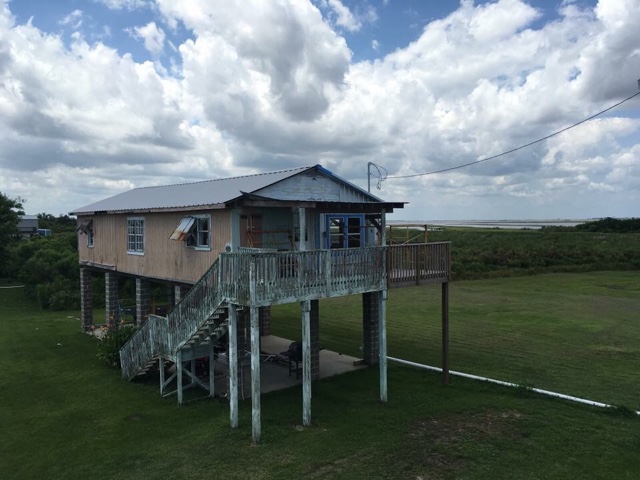That's a cypress tree. It's likely been rooted in that spot for generations, much like the Biloxi-Chitimacha-Choctaw people that still live on the island today. But now it's dead. The salty water intruding upon the island from the Gulf of Mexico makes it impossible to survive there. So it holds its place in a disappearing land, receding because of man and nature and time. Who knows how much longer it will stand.
The residents want to stay. This is their ancestral home. They've existed by fishing the waters and farming the land for generations. They used native plants to heal. But the farmland is too wet and salty and they cannot graze animals. The medicinal plants are gone. The fishing waters are unsafe from oil spills and habitats are disappearing. Food, medicine, and other necessities must be accessed by a two lane road nearly at sea level, a slash of black in an open sea of blue that was land only 30 years ago.
So why do they stay? Why don't they just leave their homes in the sky and start over?
Why does anyone stay anywhere?
Photo credit: Jennifer Rae Pierce
I can't pretend to understand; I'm not from here. The solutions are complex and emotional. But I think it's the same reason people in New Orleans "keep an axe in the attic", so in case the levees break and the waters rise families can escape to the roof until rescue comes, if rescue comes, because this is their home. They have roots here. And sometimes that's literally all you can grasp hold of when the storm surge comes.
Or maybe they just don't have anywhere else to go.
I can't pretend to understand; I'm not from here. The solutions are complex and emotional. But I think it's the same reason people in New Orleans "keep an axe in the attic", so in case the levees break and the waters rise families can escape to the roof until rescue comes, if rescue comes, because this is their home. They have roots here. And sometimes that's literally all you can grasp hold of when the storm surge comes.
Or maybe they just don't have anywhere else to go.
But life goes on. As our group was talking to Edison, the local man who penned the sign that both greets and warns visitors to the island, an ice cream truck passed by blaring Jingle Bells. There is still life here. There is hope. But there isn't much time.
We don't have an escape pod, like the one pictured above. There is no new planet for us to float away to once this one becomes uninhabitable. We only have this shared land, air, and water, and perhaps a common hope that as people of faith we can make a difference. We can right wrongs and speak truth to power. We can listen and hold space for the suffering of others. We can say with one voice that we will do better. And we can stay rooted to the words of our holy writings in the Bible and the Torah and the Qur'an and the Bhagavad Gita that the earth is sacred and that we are called to care for it and one another.
I'm encouraged by this young group of leaders. We're finding ways to bring back what we've learned to our communities across North America. We're connected by what we experienced. Though we are of many faiths, we're rooted in the hope that we can make a difference.
To what do you feel rooted?













No comments:
Post a Comment
Note: Only a member of this blog may post a comment.